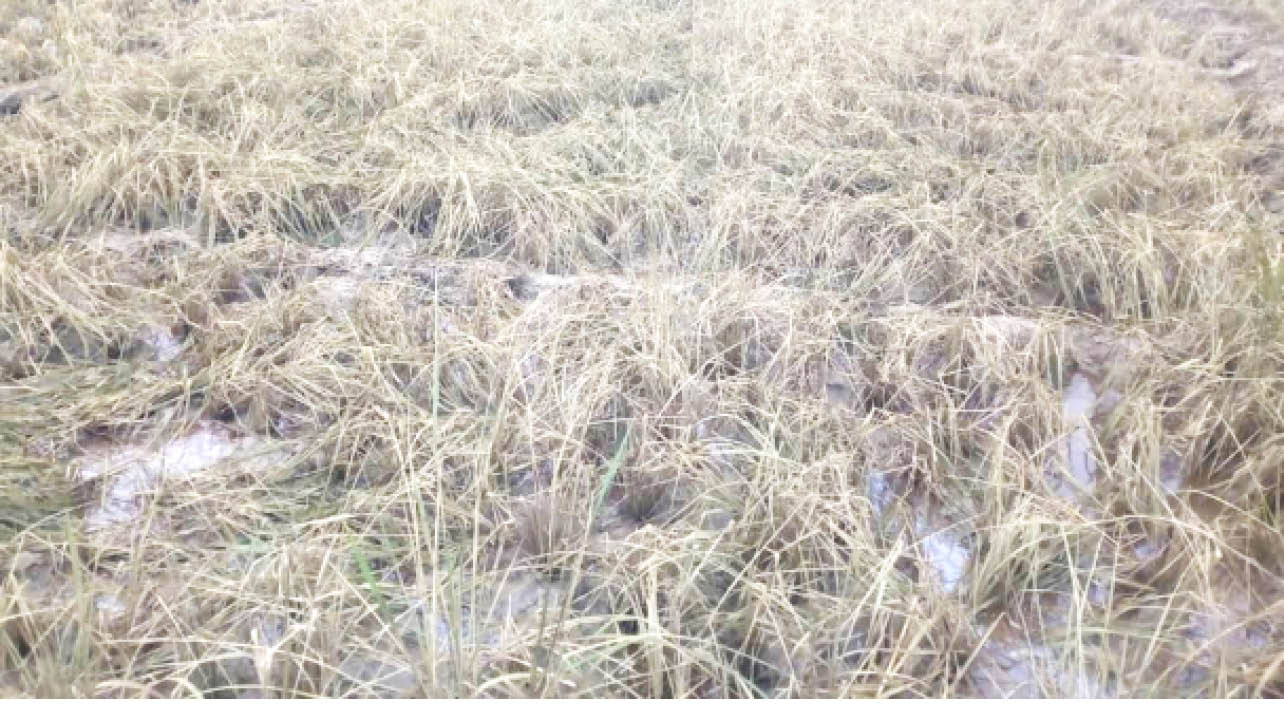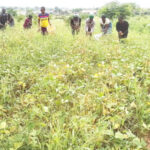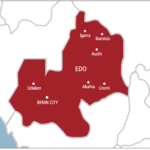Many farmers who collected loans from various agricultural intervention packages in the country for this year’s farming circle have been thrown into a dilemma on how to repay such loans as a result of devastating floods that washed away their farms. Daily Trust Saturday reports that most of the farmers across the country suffered severe losses, with many unable to salvage anything from their fields.
Experts in the country’s agricultural sector, including the National President of the All Farmers Association of Nigeria (AFAN), Kabiru Ibrahim, an architect, have warned that this year’s harvest might not be bountiful as hectares of farmlands of agricultural produce such as maize, rice, cassava, potatoes, vegetables, among others, have been ravaged by floods in most communities in Nigeria.
- Despite shortage claim: Many Nigerian medical doctors not yet employed
- Labour Party: We don’t give ‘shishi’ but need funds for Peter Obi’s campaign
Mr Toyin Adisa, an Ilorin-based agriculturist, warned that if urgent action was not taken, the unfortunate incident might affect food supply in the country this year.
These warnings are coming at a time Nigeria’s inflation rate hit a 17-year high on the back of soaring food prices and supply chain disruption in September.
According to figures from the National Bureau of Statistics (NBA), inflation rose to 20.8 per cent in September, the highest rate since 2005, up from 20.52 per cent recorded in the previous month.
The statistics also shows that the country’s food inflation rate for the month stood at 23.34 per cent on a year-on-year basis, recording a surge from the 23.12 per cent recorded in the previous month.
Farmers in dilemma
The 2022 floods, according to the AFAN’s president, are the worst Nigeria has seen since 2012. It destroyed crops in over 500,000 hectares of farmlands belonging to thousands of smallholder and commercial farmers across the country.
There are pains and agony as investments and livelihoods of many farmers were washed away within the tinkle of an eye.
Most of these farmers said they accessed loans from both the Anchor Borrower Programme (ABP) of the Central Bank of Nigeria (CBN), some from commercial banks, some from micro finance banks and some from processors, especially rice farmers.

Figures at the beginning of the wet season this year showed that the CBN has reached over 4.8 million farmers and expended over N1 trillion to farmers across the country along 23 commodities.
Although the CBN gave out approximately N1trillion under the ABP, it only recovered N400 billion with about N600bn yet to be recovered.
However, under the Commercial Agriculture Credit (CAC), the bank lent out approximately N800bn and recovered approximately N700bn.
For many rice and maize farmers under the ABP, repayment is under threat. And many of these farmers have already been encumbered by last year’s payment.
Also, under the bank’s Commercial Agriculture Credit Scheme, a total disbursement of about N744.32bn had been made for 678 projects in agro-production and agro-processing.
The amount so far repaid under the CACS could not be provided as at press time by CBN officials.
In July this year, it was reported that the Agricultural Credit Guarantee Scheme Fund, which is managed by CBN, had guaranteed 1.23 million loans given to farmers across the country.
The monetary value of the loans was estimated at N130.903bn. The Chairman, ACGSF, Stephen Okon, had said, “A total of 1,232,326 loans valued at N130.903bn were guaranteed from inception to May 2022 out of which 973,646 beneficiaries had repaid a total of N98.91bn.”
This implies that about N32bn had not been repaid by about 258,680 farmers under the ACGSF as at May this year.
A combination of the value of the various schemes indicated that the apex bank had invested about N1.874tn on the ABP, ACGSF and CACS.
Also, the summation of the outstanding repayments for ABP, ACGSF and the total disbursements for CACS indicated that about N1.4tn was still owed by farmers across the country.
When asked to comment on the repayment arrangements by farmers in view of the devastating flood, CBN’s spokesman, Osita Nwanisobi, declined to speak.
Situation states
In Taraba, one of the worst hit states, hundreds of farmers who took loans from banks and rice processors are in a dilemma on how to repay.
Findings revealed that banks, grain merchants and rice processing companies have granted loans in cash and farm inputs, including chemicals under an arrangement that farmers pay back with paddy rice or maize after harvest.
But floods have destroyed more than 70 per cent of rice farms situated on both sides of River Benue in seven local government areas of the state.
Findings revealed that some of the affected farmers have collected loans, ranging from N8m to N400, 000 to finance their farming activities this year.
Our correspondent in the state reports that some of the banks that granted loans for this year’s farming season in the state include United Bank for Africa (UBA), First Bank, Union Bank, Agric Bank, as well as the ABP, under the CBN.
Some of the affected farmers told Daily Trust Saturday that their hope of repaying the loans and making profit at harvest was dashed by the floods.
One of the farmers, Alhaji Adamu Saidu, said he collected a loan from a grain merchant under an arrangement called ‘Bada kaka’ to pay after harvest.
He said this type of loan was common among many farmers in Taraba State and farmers collect money, fertiliser and pest and weed chemicals at the beginning of the cropping season and pay with farm produce during harvest.
Saidu said he invested over N2m in his three rice and maize farms with the hope of repaying the loan with paddy rice and also making a profit.
He said that as a result of flood, he may not realise up to 30 per cent of what he was expecting to harvest from his farms.
“My biggest problem is how to repay the loan. l hope the lenders would give me a grace of one year,” he said.
At Sheka, Gassol Local Government, which is one of the worst affected farming communities in the state, more than 50 farmers took loans from commercial banks for their activities.
Haruna Muhammed Sheka, the village head, was one of the farmers that took loans from commercial banks to grow rice. Others include Abdulrashid Garbo, lbrahim Gambo, Muhammed Adamu Sheka, Umaru Suleiman, Suleiman Isa and Yahaya Umaru.
In separate interviews they said they took loans from Union Bank, First Bank and UBA to finance their farming activities but repayment would be difficult this farming season.
In Niger State, over 20,000 flood affected rice farmers said they took loans with Lapo Microfinance Bank and the Rice Farmers Association of Nigeria (RIFAN).
One of them, Alhaji Mohammad Kudu said, “The major challenge is how to pay back our loans. We took loans to buy farm inputs with high prices because the rate at which prices of farm inputs went up this rainy season was unimaginable. We took fertiliser loans from RIFAN with a promise to pay after the harvest period.”
Another victim, Baba Edozhigi said, “The agreement was to pay back the loans after we harvested the rice before this flooding occurred. We are already in a serious problem with the RIFAN. We had a similar experience five years ago, which we still battle in court.
Daily Trust Saturday gathered that some flood victims have fled their homes for fear of arrest.
They called on the government to come to their aid to enable them settle their debts.
In Gbako Local Government Area alone, several riverine communities, including Patigi-Essan, Gbadafu, Biramafu, Edozhigi, among other communities, were hit by the flood and over 40,000 hectares of rice farm, maize and sugarcane were washed away.
The public relations officer of the Niger State chapter of the AFAN, who is also the state coordinator of the Young Farmers, Kabiru Mohammed, said majority of the farmers took loans from banks and cooperatives and didn’t have the means of repayment except those who intend to engage in dry season farming.
“Where would they get money from to pay back except the government helps them? He asked.
Reports from Kogi State, one of the states worst hit by floods, indicate that this year’s flooding destroyed crops in 10 local government areas – Ajaokuta, Adavi, Bassa, Idah, Ibaji, Ofu, Omala, Koton-Karfe , Lokoja Igala Mela/Odolu.
Our correspondent in the state reports that these local governments are located at the rivers Niger and Benue plain, which made them prone to floods.
Of all the 10 local governments, it was learnt that farmers in Ibaji, Koton-Karfe, Lokoja , Idah and Bassa were said to be worst hit as their farms were flooded and crops destroyed.
The president of Ibaji Unity Forum, an umbrella organisation for the people of Ibaji Local government Area of Kogi State, Stephen Uchola, a lawyer, said all the 10 wards – Onyedega, Iyano, Ujeh, Ayah, Ojila, Odeke, Akpanyo, Unale, Ejule and Analo – were devastated by flood.
“They lost everything to the flood and are battling to survive the disaster,” he said.
Also, farmers in Unale/Onyedega, said most of them borrowed money from cooperative societies to finance their rice and yam cultivation. For instance, Uchola Awuna, a farmer who claimed to be a member the Unyogba Cooperative Society in Onyedega/Unale, said 25 of them borrowed not less N1.5m, while 10 other members borrowed up to N2m, each, but repayment has become issue.
In the same vein, Hajiya Rekiya Yusuf, a rice farmer in Lokoja, said she had gone into hiding from her creditors since her rice farms in Ajaokuta and Ogba in Bassa Local Government Area were flooded.
She claimed to have borrowed a huge amount of money to establish a rice farm, with eight others having her as the arrowhead to pay back.
“I went into an arrangement with eight others and with surety from the SWOFON organisation, under the chairperson of Hajiya Safiya Yahaya. We borrowed
N500, 000 each from a bank in Lokoja but we lost it all to the flood. Within just two days, our rice farm went under water, and the whole money and efforts washed into River Niger,” she lamented.
The chairperson of the Kogi State Small Scale Women Farmers Organisation of Nigeria (SWOFON), Safiya Yahaya, said members in Ibaji, Kogi Idah, Lokoja and Bassa local government areas all recorded damage to horticultural crops in over 17,912 hectares of land.
In particular, Teni Sule, Amina Jibril, Talatu Sani, Ramotu Yusuf, women farmers in Oforachi in Igala Mela/Odolu Local Government Area lost their cassava farms, where they invested over N4m they borrowed.
The chairperson of the SWOFON said she was in dilemma because she introduced a close family member to assist as surety before the loan was granted to them by a new generation bank.
She said most of the female farmers survived on loans from different sources, adding that she was still reaching out to many of her members to know the exact number being affected.
Reports from Cross River State also indicate that rice, yam and cassava farmers across several communities in Osopong One and Osopong Two ward in Obubra Local Government Area are lamenting huge losses.
A resident of the area, Ovat Obeng, said two of his expansive cassava farms were damaged and how to repay lenders had become a problem.
Farmlands were also destroyed in Edo State as flood ravaged communities on the bank of the River Niger.
Rice, yam, cassava, vegetable farms were submerged in various communities across Etsako Central and Etsako East local government areas of the state.
Farmers and shop owners said they lost several millions of naira, which they sourced from banks.
Some of the communities affected by flood in the state are Anegbette, Ukpeko Orle, Ofukpo, Agbabu, Osomegbe, Udochi, Yelwa, Ake Island and Ifeku Island.
A resident at Udaba community, Joseph Oshiobugie, whose farms were submerged, said he lost 10 acres of rice and cassava farms, as well as other farm produce as flood ravaged the community.
Another farmer, John Timothy, lamented that aside his rice farm of three acres that was destroyed, the few harvested produce and domestic animals were swept away by flood.
“My harvested maize kept in the barn was also swept away. I would say I lost over N5million to the flood,’’ he said.
Bayelsa is one of the most affected states in the country. For more than two weeks, all the access roads to the state were cut off as floods took over major roads, cutting off the supply of goods and food items to the state. Farmers could no longer access their farmlands.
Daily Trust Saturday gathered that fish farmers were the worst affected as their ponds were damaged.
A fish farmer in Azikoro community, Mr Kingsley, said he lost millions of naira to flood.
Indigenes of the agrarian community of Abacheke in Ohaji-Egbema Local Government Area of Imo State are still reeling in pains, two weeks after a massive flood swept through their communities.
More than 33 communities were affected, while no fewer than 3,000 people were displaced and are now accommodated in makeshift camps.
In Abacheke, 14 villages were completely submerged. They include Okishikpa, Ogbedeyi, Ogboru, Umudeyiezege, Umuezukwefi, Umueze, Umulakpu, Umuogrinya and Umuojioke.
The traditional ruler of Abacheke, Ikeji Bright, said his people could no longer go to farm, adding that their losses were estimated at millions of naira.
Farmers must repay loans to sustain scheme – CBN
Yusuf Yila, CBN’s Director of Development Finance, in a media report stated, “Every person or state that took that loan (ABP) is going to pay to sustain the scheme. We have got their Bank Verification Numbers (BVN).”
Yila is referring to smallholder farmers who received funding from state governments through the ABP but are yet to repay.
Another source close to the CBN told the Daily Trust yesterday that most of the farmers that got loans from commercial banks did not care to secure insurance policy for the facility.
“You are very much aware of the cultural and to some extent religious sensitivity to bank loans and insurance. Many people in sections of the North believe that paying interest on loans is not even acceptable. Others believe they cannot secure insurance for anything.
“Again, some of the farmers collected loans from informal or semi-formal sector like thrift or community groups. Therefore, it will take a great persuasion for the creditors to write-off the loans,” he said.
He, however, said that there is the likelihood the federal, some state governments and the business community would do a fund-raiser like what was done after the floods of 2012 to assist the distressed farmers.
By Hussein Yahaya, Vincent A. Yusuf (Abuja), Magaji Isa Hunkuyi (Jalingo), Abubakar Akote (Minna), Tijani Labaran (Lokoja), Abiodun Alade (Lagos), Eyo Charles (Calabar), Usman A. Bello (Benin), Bassey Willie (Yenagoa) & Jude Aguguo Owuamanam (Owerri)

 Join Daily Trust WhatsApp Community For Quick Access To News and Happenings Around You.
Join Daily Trust WhatsApp Community For Quick Access To News and Happenings Around You.


